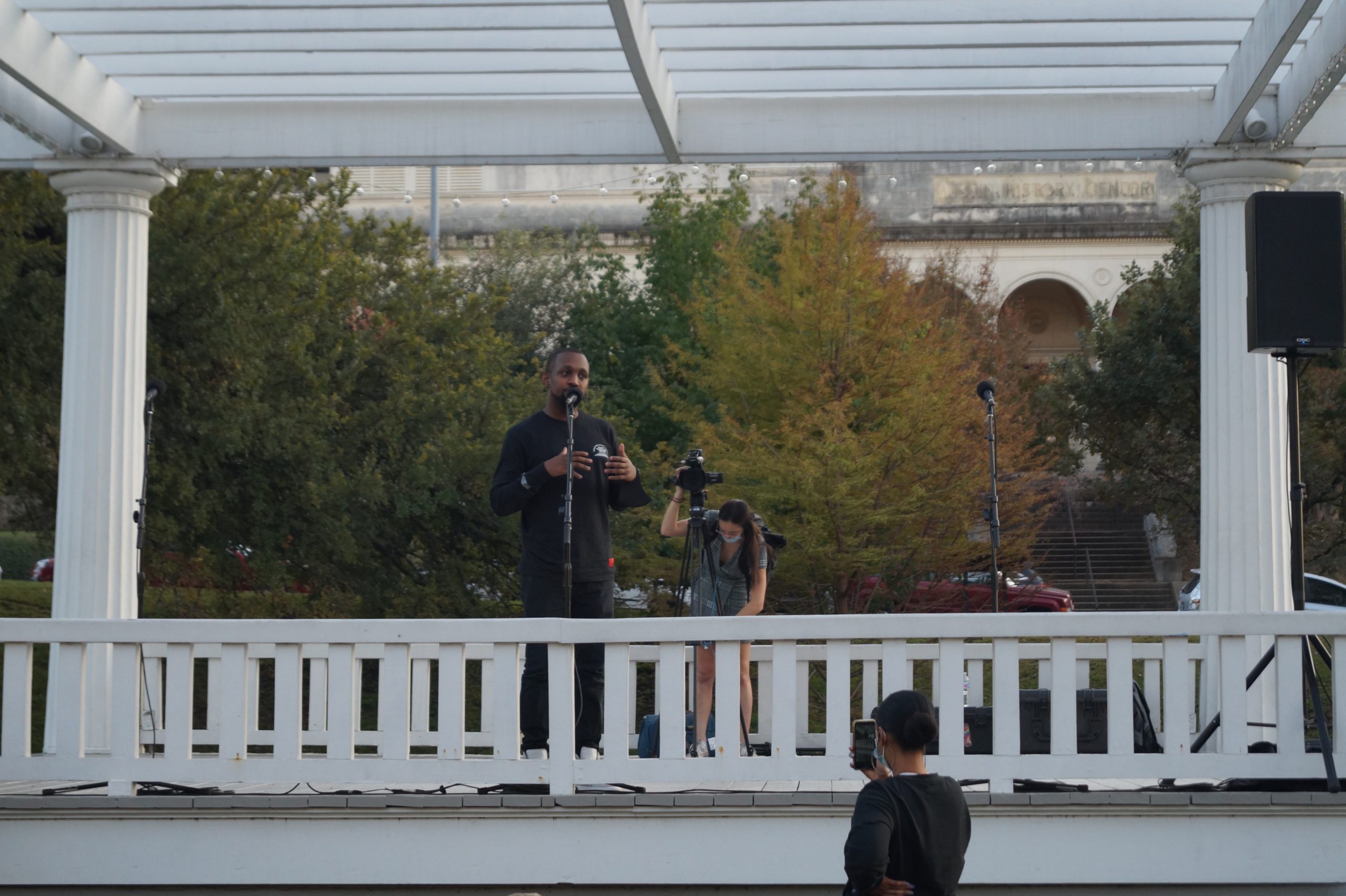A world without police would be one “filled with mimosas and jazz and dancing,” Chas Moore, leader of Austin’s foremost depolicing organization, told a rally November 4.
Moore’s Austin Justice Coalition, or AJC, is basking in recent successes and strong ties with power players in local politics, including the mayor, council members, and state lawmakers.
Years of lobbying forged these relationships, but AJC took on new prominence since June, when the group organized a huge rally demanding that the city defund the police.
Austin City Council responded in August when it voted to cut police funding by about a third, partly through eliminating vacant officer positions and partly by transferring certain police functions to other departments — a plan that hasn’t yet been fully realized.
AJC’s demands dovetailed nicely with Progressive council members’ desire to find more funds for an expanding array of social services programs, nonprofit contracts, and emergency benefits, which otherwise would come under financial pressure due to the economic downturn.
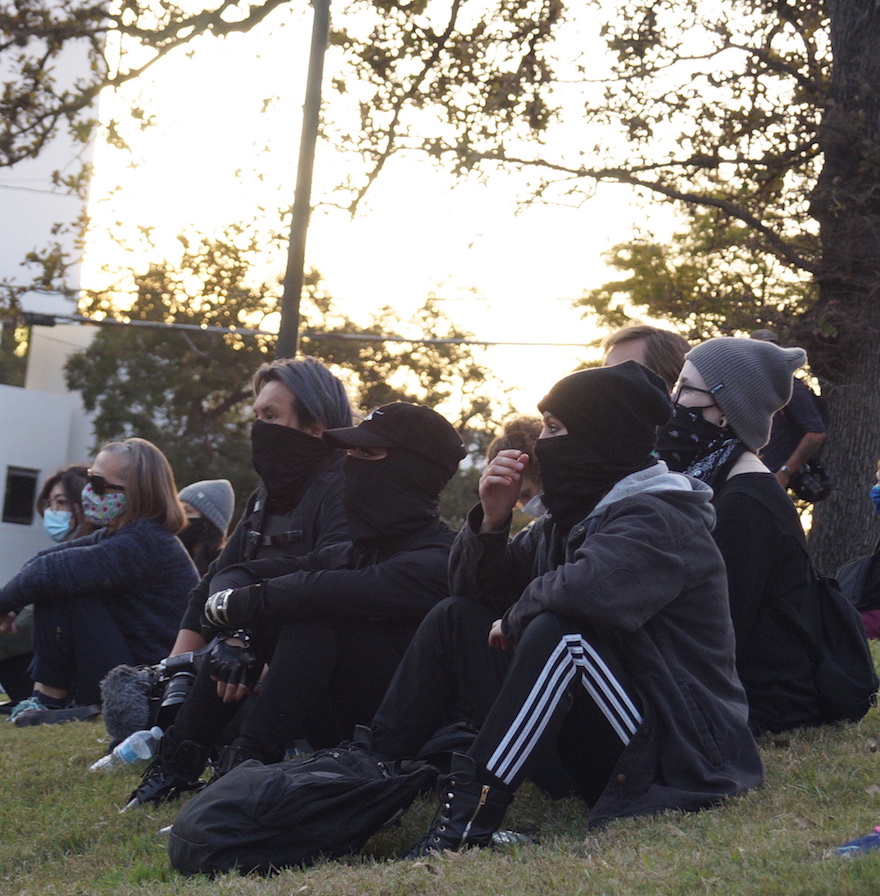
Police spending makes up a big chunk of the city budget, so reducing the police budget allowed the council to shift funds into emergency mental health services, housing, and abortion access.
AJC’s latest rally took place in Woolridge Square, the day after the election, before it was fully clear who the next president would be. It coincided with a downtown march organized by Indivisible Action, Stand Up America, and the Democratic Socialists of America.
The gathering, Chas Moore said, “gives me hope that we can actually reach this thing we’re trying to reach, which is a new world, with no parties — let’s just vote for the right people — no capitalism, no cops, free healthcare. If you’re hungry, everybody gets food. I really think we can do that.” The crowd applauded.
About 100 to 150 people attended the rally, spread out across the lawn, many carrying signs. A few were clad in the black outfits typical of the Antifa protest movement. One young man wore a Trump mask with a Pinocchio-length nose, and another carried a rubber pig head on a stick.
Moore continued, “And that makes me crazy but that makes you crazy because you’re clapping. But the only way we do that is by not stopping. I believe in a world where Texas is gonna be blue and we were this close.”
‘Utopia of What This Country Can Look Like’
“I believe that if we keep going we can get to that place.” Moore then cited recent remarks by a fellow activist, who had laid out a utopian vision for the future: “Nikia Winfield (a social work advocate), a couple Wednesdays ago, talked about this utopia of what this country can look like. And she said it was filled with like mimosas, and samosas, and jazz, and just people dancing. And I think we can get there.”
Chas Moore and other leaders in the depolicing movement hold a bleak view of law enforcement, arguing that not only do they do little good, but they actually pose a threat to the wellbeing and security of Black communities.

They cast police not only as individually racist but also as minions of evil ideologies and systems of power: White Supremacy, Capitalism, Homophobia, Misogyny — all of which Moore referenced in his speech. Banishing these forces from American society would usher in a new era of prosperity and security for all.
Standing in the way of that are politicians and power systems that defend the old order, according to the activists. Moore lamented that some 69 million Americans voted for Donald Trump. The president reportedly outperformed among Hispanic and Black men, and Moore said this was “because we still are ascribing to the ideals of White Supremacy.”
“The fact that the blue wave did not really hit the shores of Texas means that a lot of the things that we want to do in Texas are still going to be very difficult to do, which means that in two years we have to come out here and do this thing again.”
City Council Allies
In the short term, AJC is looking to help its council allies who are facing runoff elections. While all members of the council voted for the police budget cuts in August, some more than others have embraced the more sweeping rhetoric of the depolicing movement, including Public Safety Committee Chairman Jimmy Flannigan, and Council Member Greg Casar.
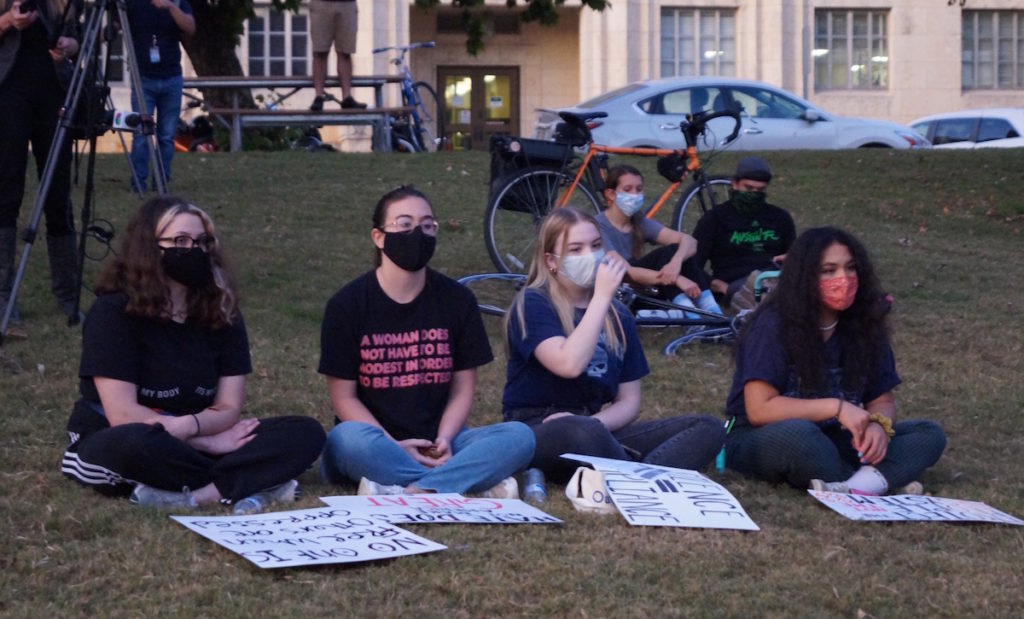
Moore said that he had spoken with Casar the day before. Casar easily swept to victory in a three-way race, winning 67% of the votes in his eastside district. But Flannigan, in Austin’s northernmost district, failed to win a majority and is headed to a runoff.
“Here in Austin we have Jimmy Flannigan who’s been really good. He’s losing potentially to somebody who was in that picture with the Proud Boys,” Moore said, referring to Flannigan’s opponent Mackenzie Kelly, who was recently photographed at a Back the Blue Rally where some ‘Proud Boys’ flashed white power signs. (Kelly told CBS Austin that the Proud Boys “do not represent my values or beliefs nor would I associate with them”).
“So we have to make sure that we’re getting out in Jimmy Flannigan’s district,” Moore said. “Alison Alter is another person who’s been really good and she’s voted for police reform and the defunding. She’s also going to a runoff. We kept our colleague Greg Casar on by a lot — that deserves a round of applause. But the fact remains we have so much work to do.”
State Policy Priorities
Beyond local politics, Austin Justice Coalition and allied organizations are preparing for the upcoming legislative session which starts in January. Some state lawmakers, including Republicans, have said that the session would include a focus on criminal justice reforms.
AJC’s policy lead Warren Burkley said, “As y’all know we are the lead on defunding APD… we’ve got great momentum right now. We want to keep that same energy going into the state policy into lege coming up.”
He said they would back the proposed George Floyd Act, by Rep. Senfronia Thompson, which would ban chokeholds during arrests and require law enforcement officers to intervene or render aid if another officer is using excessive force while on the job.
AJC also will back a bill that would ensure “nobody should get cuffed for a taillight out,” Burkley said. He referred to this bill as the Sandra Bland Act, though in fact a bill by that name already became law in 2017.
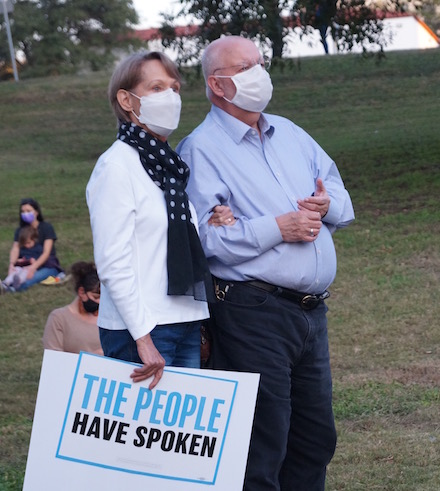
That law mandated that county jails divert people with mental health and substance abuse issues toward treatment and required independent investigations of jail deaths.
A bipartisan group of lawmakers in 2019 sought to pass an add-on to that bill, limiting the power of officers to jail citizens for very minor offenses, like a missing taillight. The bill failed when the Democratic Caucus divided over certain provisions and missed a deadline for passing it over to the Senate before the legislative session ended.
Burkley said that activists would also fight for changes to police licensing rules, and oversight: “We’re always trying to increase police accountability because right now there is none.”
Activists will find at least one open door at the Texas Senate, where newly installed state senator Sarah Eckhardt is sympathetic to the protesters’ cause, though she noted that she doesn’t necessarily agree with all of what they are calling for.
She attended the November 4 rally and spoke very briefly. “In the interest of full disclosure I am a former prosecutor,” she began, also referring to herself as “the man,” and “a politician.”
“I need you, and we need each other, and that’s why I’m here. And I think thats why y’all are here. We may not always agree but a sign of a functioning and healthy democracy is when conflict is creative and not disruptive, when we can find new paths through listening to one another and arguing with one another — arguing well. So that’s why I’m here tonight and I’m very, very grateful to be invited up to the mic. Thanks. be safe going home.”
Coalitions Within the Left
AJC’s organizing efforts involve forging ties with an array of grassroots and national groups. Other speakers at the event included Yasmine Smith, director of development for Austin Area Urban League, which focuses on economic issues affecting African Americans, and a speaker who identified himself only as “King,” founder of Star Power Black Kollective.
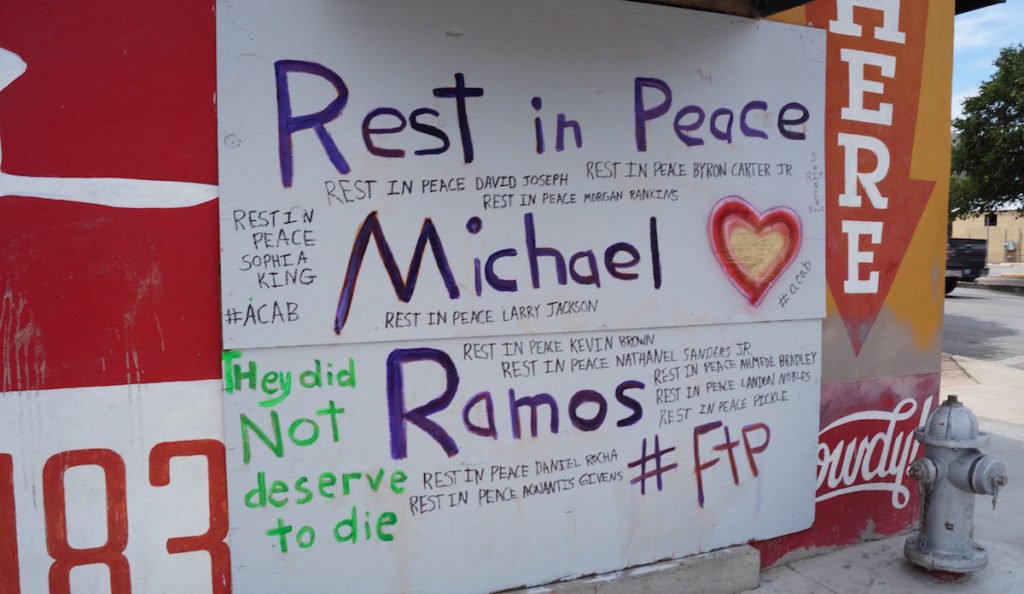
In his speech, Moore referred to ties with the Marxist protest group Mike Ramos Brigade, among others: “I think we’ve been doing some strides, like over the past year. If I may, AJC and the Mike Ramos Brigade have put aside our petty differences and been willing to work together on the things we can agree on.”
(At an AJC rally at Huston Tillotson-University in June, Mike Ramos’ mother gave a speech disavowing any association with the Mike Ramos Brigade. The group is named after a man who died in a police shooting in April 2020).
Moore said that AJC also enjoys good relations with local socialist organizers: “DSA (Democratic Socialist of America) and AJC have always had a good relationship. I think it’s only going to get better. We’re more willing to work with anybody on the side of right because we’re all we have until we can get to a place where we have — this whole country should be blue, if you think about the ideals of what America is.”
“I would offer up the idea that we’re just getting started,” Moore said. “No matter if Biden wins, tomorrow the police institutions around the world are still going to exist. There are people still in prison, there are people that want to roll back our homelessness laws, people are still going to be gentrified, Black women are still going to die at the highest rate when giving birth just because they don’t get the proper healthcare they need, people with disabilities are not going to get the rights and the justice they deserve.”
